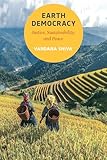Earth democracy: justice, sustainability and peace
Material type: TextPublication details: 2005 North Atlantic Books CaliforniaDescription: 184 pISBN:
TextPublication details: 2005 North Atlantic Books CaliforniaDescription: 184 pISBN: - 9781623170417
- 333.7 S4E2
| Item type | Current library | Collection | Call number | Status | Date due | Barcode | Item holds | |
|---|---|---|---|---|---|---|---|---|
 Book
Book
|
Ahmedabad General Stacks | Non-fiction | 333.7 S4E2 (Browse shelf(Opens below)) | Available | 179325 |
Browsing Ahmedabad shelves, Shelving location: General Stacks, Collection: Non-fiction Close shelf browser (Hides shelf browser)
| No cover image available |

|

|

|

|

|

|
||
| 333.7 N2T7 The transition to coal | 333.7 P5 Planning and ecology | 333.7 S2B3 The bet: Paul Ehrlich, Julian Simon, and our Gamble over earth's future | 333.7 S4E2 Earth democracy: justice, sustainability and peace | 333.7 T4E6 Environmental economics: the essentials | 333.7 T4N2 Natural resource economics: the essentials | 333.70954 C7 Critical themes in environmental history of India |
oldly confronting the neoconservative Project for the New American Century, world-renowned physicist/activist Vandana Shiva responds with Earth Democracy, or, as she prophetically names it, "The People's Project for a New Planetary Millennium." A leading voice in the struggle for global justice and sustainability, here Shiva describes what earth democracy could look like, outlining the bedrock principles for building living economies, living cultures, and living democracies.
Starting from the initial enclosure of the commons-the privatization of 6 million acres of public land in 18th-century Britain—Shiva goes on to reveal how the "commons" continue to shrink as more and more natural resources are patented and fenced. Accompanying this displacement from formerly accessible territory, she argues, is a growing attitude of disposability that erodes our natural resources, ecological sustainability, and cultural diversity. Worse, human beings are by no means safe from this assignment of disposability. Through the forces of neoliberal globalization, economic and social exclusion work in deadly synergy to perpetrate violence on vulnerable groups, extinguishing the lives of millions.
Yet these brutal extinctions are not the only trend shaping human history. Forthright and energetic, Vandana Shiva updates readers on the movements, issues, and struggles she helped bring to international attention—the genetic engineering of food, the theft of culture, and the privatization of natural resources—and deftly analyzes the successes and new challenges the global resistance now faces. From struggles on the streets of Seattle and Cancún and in homes and farms across the world has grown a set of principles based on inclusion, nonviolence, reclaiming the commons, and freely sharing the earth's resources. These ideals, which Shiva calls Earth Democracy, will serve as unifying points in our current movements, an urgent call to peace, and the basis for a just and sustainable future.
There are no comments on this title.

